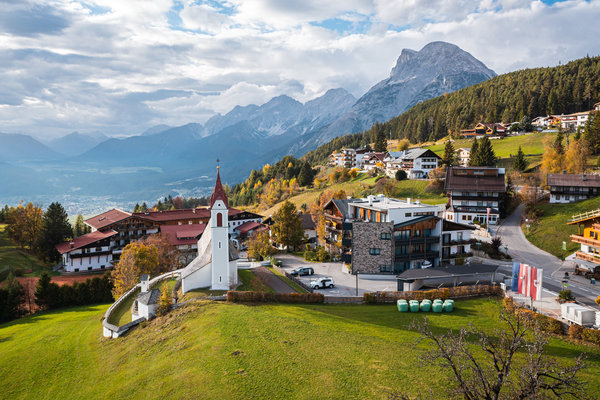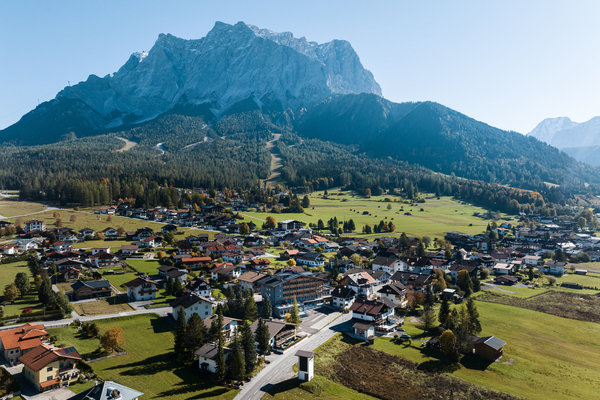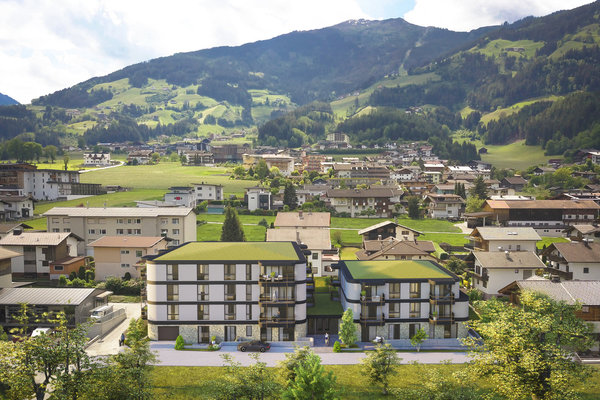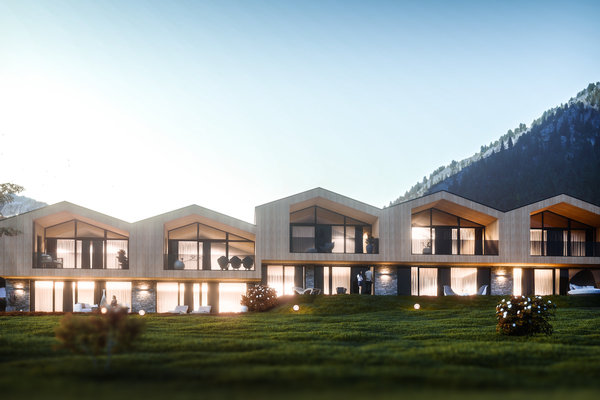May 3rd 2023
Real estate as a value investment in Tyrol: Why it's worth it
Tyrol, the Austrian province in the heart of the Alps, is known for its breathtaking scenery and tourist attractions. But away from skiing vacations and hiking trips, Tyrol also offers a promising opportunity for investors and investors who want to diversify their portfolio and build up their assets in the long term. Tyrol is not only a popular vacation destination, but also an attractive location for real estate investments. Due to the high demand and limited availability of real estate in the region, prices have continuously increased in recent years. This makes Tyrol an interesting destination for investors who want to invest their capital in real estate.
One way to invest in real estate in Tyrol is to purchase of vacation apartments or vacation homes. Tyrol attracts tourists all year round, especially in winter when skiing and other winter sports are on the agenda. Buying vacation properties in the region can be a lucrative way to generate regular income from rentals. However, it is important to do a thorough market research to ensure that the property is in a good location and will rent well. Here you can find our current vacation properties.
Another possibility to invest in real estate in Tyrol is the purchase of apartments or houseswhich can be rented out on a long-term basis. The demand for apartments and houses in Tyrol is high, especially in cities like Innsbruck or Kitzbühel. Investors can benefit from long-term leases that generate stable and reliable income. However, it is important to closely monitor the real estate market in the region to ensure that rents are appropriate and a sustainable return can be achieved. Here you will find our current residential projects.
Another advantage of investing in real estate in Tyrol is the fact that the region offers a high quality of life. The picturesque landscape and rich cultural heritage attract not only tourists, but also locals who want to live and work in the region. This means that there is a steady demand for housing in the region, which makes investing in real estate even more attractive. It is also important to familiarize yourself with local laws and regulations, especially when it comes to buying vacation properties.
Overall, Tyrol offers a variety of opportunities and risks as a location for real estate investment. Investors should conduct thorough market research to ensure they are making a profitable investment. It is also important to seek professional help to ensure that all legal and financial aspects are covered, here the competent team of Tirol Real Estate is at your disposal. However, if an investment in real estate in Tirol is successful, it can generate a stable and sustainable income for the investor.
Tyrol as a location
The first reason why Tyrol is a suitable location for real estate investment is its attractiveness as a tourist region. Tyrol attracts millions of visitors every year who enjoy the spectacular mountain scenery and take pleasure in the wide range of leisure activities. This makes Tyrol a desirable place to invest in vacation properties such as chalets or vacation apartments, which can be rented out and thus generate long-term income.
In addition, Tyrol also offers a strong economy, ranging from industry and agriculture to high-tech companies. This creates jobs and a stable demand for housing, which makes investing in residential real estate in Tyrol attractive.
Value enhancement potential
Another advantage of real estate investments in Tyrol is the potential for value increases. Tyrol is one of the most popular vacation regions in Europe and the demand for real estate in this region is correspondingly high. This has led to an increase in real estate prices in recent years. It can be assumed that this trend will continue in the future, as the demand for real estate in Tyrol is expected to remain high and the area of building land is particularly limited.
Stable market conditions
Tyrol also offers stable market conditions for real estate investments. Unlike other markets, which may be more volatile and experience fluctuations in demand and prices, Tyrol offers stable and growing demand for real estate. This is due to the strong economy and attractive location, which make Tyrol a desirable residential and vacation destination.
Real estate investment risks
As with any investment, there are risks to real estate investments in Tyrol that must be considered. One important factor is liquidity - real estate is usually a long-term investment and it can be difficult to sell it quickly if a quick liquidation is required. In addition, there may be unforeseen repair and maintenance costs that can affect the return on the investment.
It is therefore important to conduct thorough due diligence and hire a professional property management company to ensure that Tyrol real estate investments are used to their fullest potential and maximize the potential for long-term growth. Our team will advise you in detail, please contact us.
Conclusion
Overall, Tyrol offers a promising opportunity for investors and investors looking to diversify their portfolio and build their wealth over the long term. The strong economy, stable demand for real estate, tax advantages, and potential for long-term revenue streams and appreciation make Tyrol an attractive destination for real estate investment. However, it is important to consider the risks and conduct thorough due diligence to ensure that investments are maximized and the potential for long-term growth is maximized.
The competent team at Tirol Real Estate will be happy to advise you and offers a broad portfolio of interesting properties for sale throughout the Tirol.
The question of when investing in a property pays off is not easy to answer, as many factors play a role. It depends, among other things, on what type of property is being bought, in which region it is located, how high the purchase prices and rents are, how high the interest rates are for financing and how high the inflation is.
Basically, one can say that real estate is profitable as an investment if the expected return is higher than the return of alternative forms of investment, such as shares or bonds - a trade-off between risk and return must be made.
One way to measure the profitability of a real estate investment is to calculate the gross rental yield. This key figure indicates how high the expected rental income is in relation to the purchase price of the property. For example, a gross rental yield of 5% means that annual rental income accounts for 5% of the property's purchase price.
Another way to assess the profitability of a real estate investment is to calculate the net rental yield. This key figure also takes into account the running costs, such as operating costs and maintenance costs. For example, a net rental yield of 3% means that the annual rental income minus the running costs makes up 3% of the purchase price of the property.
An investment in a property usually pays off in the long term, since the purchase prices and rents usually increase over a longer period of time. However, it is important to carefully consider and calculate the expected return and potential risks to ensure that the investment is profitable and fits with one's financial goals.
It is also important to remember that real estate can be attractive as an investment not only because of the expected return, but also because of other factors such as portfolio diversification, tax advantages and the possibility of owner occupation.
Real estate prices in Tyrol have developed positively overall in the last 10 years. However, the exact development varies depending on the region and property type.
In the conurbations such as Innsbruck or Kufstein, the prices for condominiums and houses have risen sharply in recent years. According to the real estate price index of the Tyrolean Chamber of Commerce, the prices for condominiums in Innsbruck rose by an average of 68% from 2010 to 2020. For single-family homes in Innsbruck, prices rose by an average of 41% over the same period. In other cities and communities with high demand and limited supply, such as Seefeld or St. Anton am Arlberg, property prices have risen sharply in recent years.
In more rural areas or regions with low demand, on the other hand, property prices have tended to remain stable or have increased only moderately. However, there are exceptions here too, especially for holiday properties, which often achieve higher prices due to their special location and demand.
It is important to note that the development of real estate prices is influenced by various factors, such as the general economic situation, demographics, demand and supply in the real estate market and political decisions. It is therefore difficult to accurately predict how property prices will develop in the future.
High inflation can affect property purchases in Tyrol in various ways. Here are some possible effects:
- Rising real estate prices: When inflation is high, the prices of assets like real estate tend to rise as well. That's because investors are trying to put their money into real assets to escape inflation. This can increase the demand for real estate and thus the prices.
- Higher Mortgage Rates: High inflation can also lead to higher interest rates to fight inflation. This can affect the mortgage rates that buyers have to borrow to purchase a property. Higher interest rates can make buying a property more expensive and thus reduce demand.
- Depreciation of money: High inflation can cause money to lose value. This means that the money that is enough to buy a property today may not be enough in the future. Investors may therefore be inclined to invest their money in tangible assets such as real estate to preserve the value of their money.
- Impact on the Economy: High inflation can also have an impact on the economy, which in turn can affect the real estate market. A weak economy can lead to a drop in housing demand, which could lower prices.
It is important to note that the exact impact of high inflation on buying a property in Tyrol depends on various factors such as the level of inflation, the general economic situation and political decisions. Investors should therefore always conduct a comprehensive analysis to assess the impact on their specific situation.
A due diligence (also known as a DD) is a comprehensive investigation of a company or transaction that is conducted prior to entering into an agreement or contract. The objective of this review is to identify and evaluate all relevant facts, information and risks associated with the transaction or company. Due diligence enables the prospective buyer or investor to make an informed decision as to whether the transaction or company is a worthwhile investment.
Typically, due diligence includes a review of the financial, legal, tax and operational aspects of the company or transaction. This may include, for example, reviewing balance sheets, contracts, permits, tax returns, insurance policies and business transactions. In addition, it may be necessary to examine other aspects such as environmental protection, IT security or customer relations.
A due diligence is usually a comprehensive and time-consuming task that should be performed by experienced professionals. Depending on the size and complexity of the company or the transaction, it can take several weeks or even months. The results of the due diligence are usually summarized in a report that is made available to the prospective buyer or investor. Based on these results, the buyer or investor can then decide whether or not to go through with the transaction.







